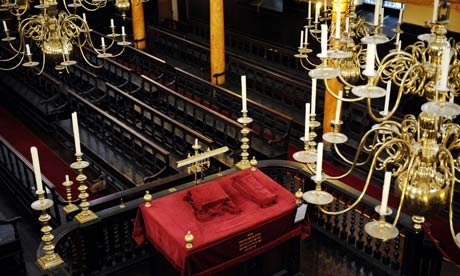Suffer the little children to come unto me
Should a 10-year-old Jewish girl be baptised against her mother's wishes? Judge Platt handed down an empathetic judgment last week

Bevis Marks Synagogue in London. Photograph: Linda Nylind for the Guardian
When might it be in the best interests of a Jewish 10-year-old to be baptised as a Christian? That was the question Judge Platt had to decide at Romford county court in Essex earlier this year. His judgment, released for publication at the end of last week, makes fascinating reading.
It involves a couple who were divorced in 2010 after 14 years of marriage. They had two children: a girl who is now nearly 11 and a boy who is nearly six. Both parents are Jewish, as are all four grandparents.
As usual in such cases, the family cannot be identified. But the impression one gets from the judgment is of an extended family that is culturally Jewish rather than religiously committed. According to the father, neither his own parents nor his former wife's parents "have ever strictly observed what would be regarded as the outward manifestations of the Jewish faith, for example by regular attendance at the synagogue or observance of Jewish festivals or kosher dietary rules".
That approach was followed by the father and mother themselves, the judge found. "The only occasions on which they attended the synagogue were as guests at a wedding or bar mitzvah celebration. Neither of them took any steps to provide the children with any instruction in the Jewishreligion; nor did they celebrate or observe any of the religious festivals in the Jewish calendar. They would often be at work on Jewish holy days."
So their children grew up without any religious beliefs or practices - even in the home, which Jews regard as more important than the synagogue for these purposes. After their divorce, the couple agreed that their two children should live with each parent alternately for a week at a time.
What made things more complicated was that the father had decided to become a Christian. After the marriage had come to an end but while the couple were still living under the same roof, the father experienced what he described as a meeting with God. "He started attending church each Sunday which naturally excited the interest of his children," the judge said. "They asked if they could come with him and, with the agreement of the mother, they have been attending church regularly ever since."
Last summer, the father took both children to a Christian residential event, run by New Wine, a well-established group of local churches which wants "to see the church become a missionary movement". On the way back, the daughter told her father that she, too, had experienced an encounter with God and wished to be baptised.
After the daughter had told her mother this, the mother applied for an injunction to stop the father baptising or confirming either child. The application was made without notice to the father.
When the father heard that a temporary order had been made against him, he complained that his former wife had given their daughter the impression that the couple were fighting over an issue that they should have resolved without going to court. Judge Platt agreed that "by choosing the route of confrontation rather than negotiation, she has presented [the daughter] with a picture of her parents at war, which is deeply distressing to the child and has caused her emotional distress".
But what was the judge to do now? By law, his "paramount consideration" must be the "child's welfare". The court has no power to order the girl to baptised. What the judge had to do was to decide whether he should stop the father from taking steps leading towards the child's baptism, as the mother had asked.
In the end, the judge was satisfied that the child's "welfare interests are best served by allowing her to be enrolled in a baptism class and to present herself for baptism into the Christian church as soon as she is ready". However, the judge ruled that her confirmation into the church should not take place before she is 16, unless the mother agrees.
Tellingly, the judge found that the girl's "upbringing for the first eight years of her life lacked any significant religious teaching upon which her own moral compass could be based. Her exposure to Christian teaching and her positive reaction to that clearly indicates that she has an emotional need which is being met by this experience."
After the parents had separated, the mother's only concession to this emotional need was to light what the judge describes as "a candle" at home on Friday nights. Since Jewish custom is to welcome the sabbath by lighting two candles, and sometimes more, I hope that this was an error by the judge rather than by the mother.
The mother also did herself no favours by asking a rabbi from the strictly orthodox Lubavitch movement to write a letter to the court. The rabbi, based at Buckhurst Hill in Essex, had clearly not been given the full facts of the case.
So it was left to Judge Platt to set out his own knowledge of Jewish law, while explaining that it had played no part in his decision-making process because it was not based on expert evidence. As he understood it, "a person who is born a Jew cannot deprive himself of his Jewish status. Christian baptism does not have any effect on that status. The purported act of conversion to Christianity simply has no legal effect and [the child] would therefore be free to resume her Jewish faith at any time if she wished to do so."
That strikes me as entirely accurate. One may become a bishop or a cardinal and still remain Jewish under Jewish law.
The judge also went to some lengths to help the girl understand what he had decided, writing her a letter in child-friendly language. "Being baptised does not mean that you give up your Jewish heritage," he told her. "That will always be part of you and I hope that you will continue to learn more about that heritage and about your mother's faith.
"Even after you are baptised you are still free to change your mind about your faith later when you are older. Finally, and this is the most important thing, both your mother and father will carry on loving you just as much whatever happens about your baptism."
Judge Platt directed that the child was not to be shown a copy of his judgment, though it is now a public document and there is nothing to stop her finding it and reading it.
What are we to make of this ruling? It rather depends on one's starting point.
Legally, it strikes me as impeccable. The girl is a bright and intelligent child, academically advanced and able to express her views. As a result of her upbringing, and no doubt as a result of her parents' divorce, she has emotional needs which she wishes to satisfy through religious practice. She has seized on the first religious experience to which she has been exposed.
If one of her parents had adopted an observant Jewish lifestyle and then exposed her to it, she might just as easily espoused the religion of her birth. As the judge correctly observed, that remains possible. People change as they grow older.
The girl may be strengthened by her new-found religious faith. Or she may become confused and disillusioned. Odom Brandman, the Lubavitch rabbi from Buckhurst Hill, was wise to tell the court that Jews "don't encourage conversion either way, as it is unnatural for a person to change the religion they are born into and which thus is ingrained in their soul".
One should not be too hard on the girl's parents. By all accounts, they were bringing their children up in the same way as they themselves had been brought up. Cultural Judaism can be a strong force for good.
And what if your starting point is non-religious? You may well think that it would have been in the child's best interests if she could have remained entirely secular, as she had been for the first eight years of her life. Let her choose when she grows up, some might say.
But the wider lesson from this case is that it is surely desirable to give one's children some sort of ethical structure to cling on to as they grow up - beyond teaching them obedience to their parents and the difference between right and wrong, as these two children were properly taught. It may be one of the world's established religions, provided it is taught in a loving, measured way. It may well be humanism, atheism or even agnosticism. But it must surely be something



No comments:
Post a Comment